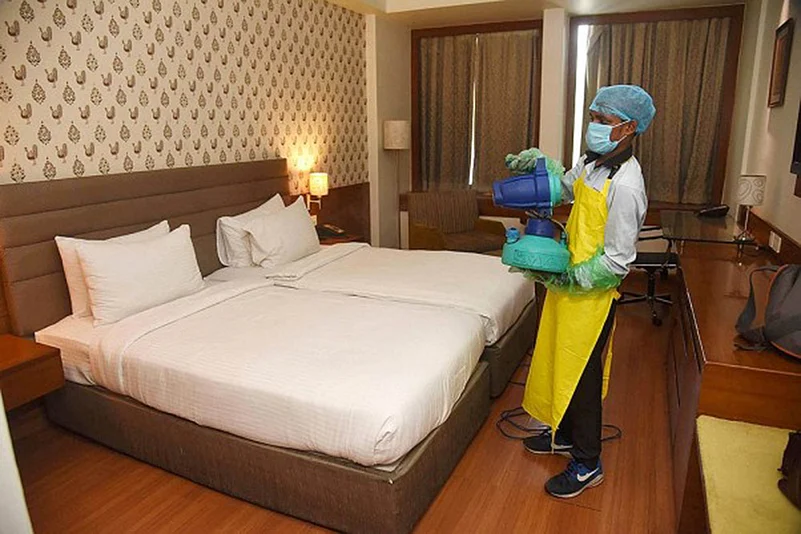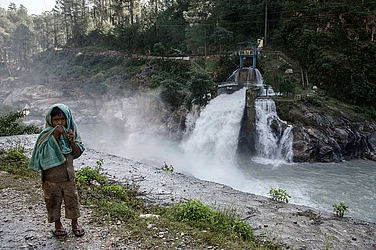Taking a stroll down Vana a wellness retreat nestled in the foothills of the Himalayas in Dehradun, is like a dream. At Vana sustainability is a way of life. Vana draws inspiration from its namesake-- forest - a place that protects, nurtures and nourishes, while also providing space to discover and flourish.
Vana's retreat is a place for anyone seeking wellbeing and goes beyond conventional understanding. The retreat aspires to create a thoughtful balance, focusses on what is necessary for an individual, inculcating a sense of gratitude for the environment and everything it provides us with.
Prasoon Pandey, General Manager, Vana says, “Since the retreat’s conceptualisation, sensitivity to ecology has played an intrinsic role in our thinking. The Vana team strives to create and maintain harmony between wellness and the natural world. With a gentle hand, we cultivate an eco-friendly retreat that not only aligns with, but also nourishes, the ecosystem that surrounds us. Vana is especially conscious of energy optimisation, with special efforts put in place to manage water and waste as effectively as possible.”
Vana has been designed to ensure that all guests practice an energy-efficient means of habitation during the retreat. In order to achieve this, they carefully monitor their energy use in all spaces. Vana achieved LEED Platinum status in 2015 making it India’s first retreat to have attained this standard of environmental design. From the outset Vana installed 99 percent LED lighting throughout its premises to ensure maximum energy conservation.
“Thanks to ‘Variable Frequency Drives’ on our motors, we regulate energy consumption to be as low impact as possible. Energy use from our HVAC (heating, ventilation, and air conditioning) and plumbing systems are determined on a ‘Revolution Per Minute’ basis. Our ‘In Com Control’ system detects whether the room is occupied through motion-sensors, ensuring that lighting and heating are only in use when the guests are in the room,” an official at the resort says. During the night, lighting is maintained at bare minimum levels to not just preserve energy but to also not disturb the nocturnal habitat in the region.
Moving to Fagunia Estate in Nainital, one notices that the rooms are compact in size and have used traditional Kumoan stone building practices to retain warmth and reduce energy usage for heating. Anil Cherukupalli, the owner of Fagunia Estate says that the estate uses as little artificial lighting as possible, relying heavily on natural resources. “Through smart placement of windows, we make use of natural light so that there is no need for usage of artificial lights during the day, reducing our energy usage. Hot water in our bathrooms is supplied using a centralised solar water heating system. We also have a solar power backup inverter system wherein the power of the sun is utilised to provide power backup. And last but not the least, we use LED lighting throughout, a star rated inverter-based refrigerator and minimal external lighting as other energy saving features,” says Cherukupalli.
The staff at Fagunia Estate have also taken steps to reduce indirect use of fossil fuel energy. Almost 50% of food consumed at the estate is reportedly sourced from neighbouring farms. “We try to source at least 50 percent of our food from our farms or neighbouring farms or within a 5 km radius to reduce our use of fuel. Bed linen and towels are changed every four days of a guest’s stay to minimise use of a washing machine and water and detergent for washing. We also do not use electric dryers and sun-dry our clothes. In future, we are hoping to go completely off grid by producing all the power we need through an onsite solar panel power generation system,” says Cherukupalli.
Many eco-friendly and sustainable features have been incorporated into the construction and running of Fagunia Estate to reduce the hotel’s carbon footprint. During construction, the already existing contours of the site were adhered to minimise building pressure on the mountain slopes. Almost all of the stone and most of the wood used in the construction was recycled or upcycled from earlier pre-existing houses at the site. Much of the furniture in the villa is refurbished, antique furniture. Landscaping was minimal and only local grass was used for the lawns to reduce watering and use of chemical fertilisers.
The villa’s rooms are compact to retain warmth and reduce energy usage for heating. “Solar water heating, solar power backup and LED lighting reduce electricity consumption while rainwater collection and storage help with conservation of water. A recharging soak pit helps in on site treatment of grey water. Black water waste is safely and sustainably decomposed through a recycling system onsite that converts sewage into natural fertiliser for use on our farm,” adds Cherukupalli.
When asked about the extra costs incurred, Cherukupalli says that the satisfaction of operating the estate in an eco-friendly way trumps everything else. “It does cost extra to be more energy efficient and eco-friendly but the satisfaction of doing our little bit to protect the environment is immense. And in the long run, a focus on energy efficiency and usage of renewable power does pay back by reducing our usage of grid energy and fossil fuels whose costs as we know only keep on increasing,” he says.
In all green hotels and resorts, wet waste is composted, plastic use is minimised and whatever plastic waste is generated is safely incinerated in an on-site incinerator. Guests are encouraged to take back with them whatever plastic waste they bring or generate during their stay.
At all energy efficient hotels and resorts, rainwater is harvested and efficient water treatment plants ensure that the recycled water is then used for irrigating gardens and lawns. They have specially designed faucets, which ensure minimal wastage of water. Most of these hotels have their own bottling plant which further allows them to reduce the use of single use plastics by as much as 100,000 plastic bottles per year.
Focused approach and motivation to have an energy efficient hotel is a major challenge that most hoteliers face says Soumitra Pahari, General Manager, Mercure Hyderabad. “Energy-conservation work is time consuming and needs to be scheduled during low business hours to ensure no inconvenience is caused to guests. Working on the terrace to instal solar panels is a very tough job. Also we incurred maximum cost while installing the solar panels. The capital invested cannot be termed as an extra cost as the ROI (Return on Investment) that’s generated through solar plant implementation covers the capital investment,” says Pahari.
Building energy efficient hotels and turning a green leaf is not an easy task. Mahanteshwar Salimani, Director of Engineering, Novotel Bengaluru says, “With constant recording, analysing, and monitoring along with investing in new and efficient energy improvement equipment, we were able to save a remarkable amount of energy.”
“Apart from the regular expenditure, they have to spend money for regular maintenance of equipment so that efficiency of the machines is maintained. Also, replacement of conventional lighting with LED, introduction of electric heat pumps in place of conventional boilers for water heating, solar water heating system and better efficiency screw chillers helped us. The initial installation process demands extra funds, but it helps in saving energy and money in the future. Working on the lines of Planet 21 initiatives, Accor’s sustainable development program, we have always been committed to environmentally friendly and sustainable actions,” adds Salimani.
India is slowly warming up to the idea of sustainable buildings, especially in the hospitality industry for the majority of Greenfield projects. India does have efficient building concepts coming up and only time will tell how far the country will progress in its endeavours to conserve energy.
(The story is being published as part of CMS – BEEP Media Fellowship Program)
















